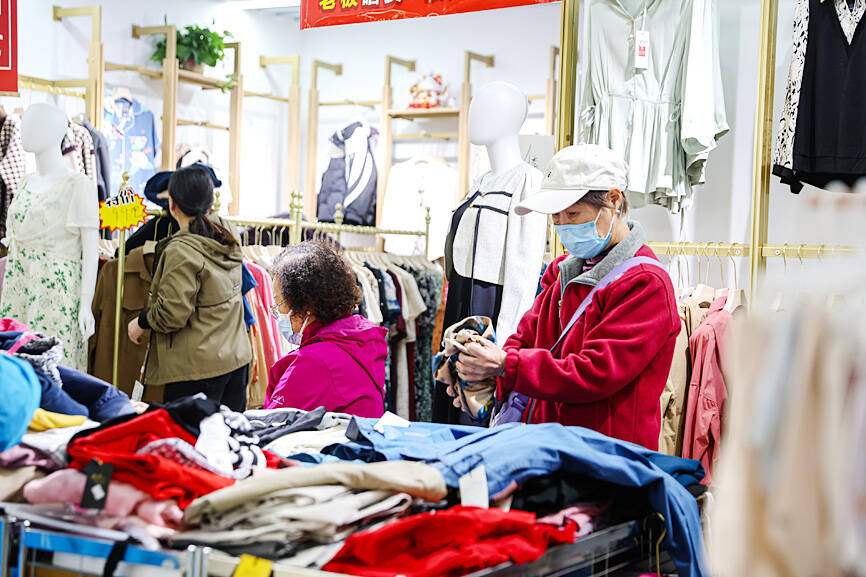China’s inflation rate slowed last month, official data showed yesterday, as policymakers struggle to jumpstart persistently low spending in the world’s second-largest economy.
The consumer price index (CPI) last month edged up by 0.1 percent year-on-year, the Chinese National Bureau of Statistics said, below the 0.4 percent gain forecast by a Bloomberg poll of analysts.
“In March, under the impact of factors such as the seasonal decline in consumer demand after the holidays and the overall sufficient market supply, the increase in the nationwide CPI ... somewhat declined,” the bureau said.

Photo: EPA-EFE
The figure represented a slower rate of growth from 0.7 percent in February, when consumer prices emphatically bucked a deflationary trend stretching back to August last year.
Core inflation, which strips out volatile food and energy prices, slowed to 0.6 percent last month from 1.2 percent in February, the bureau said.
The slowdown “indicates that China still faces the risk of deflation, as domestic demand remains weak,” Pinpoint Asset Management Ltd (保銀私募基金管理) chief economist Zhang Zhiwei (張智威) said.
“Fiscal spending has been weak so far this year. Export growth by itself cannot boost aggregate macro activities without help from more supportive fiscal policy,” Zhang said.
In a sign that deflation could continue to haunt the economy in the next few months, price competition in some industries has intensified.
Firms that produce materials for construction, such as zinc smelters, have been forced to lower their charges because of excess capacity, while producers of electric vehicles are offering aggressive discounts to lure customers.
With the housing market slump showing no signs of a turnaround, subdued demand for building materials such as steel is dragging producer prices down.
The producer price index continued to fall last month, down 2.8 percent year-on-year, with metal smelting and pressing costs falling at an annual rate of 7.2 percent, while mining and washing of coal — used for steelmaking — tumbled 15 percent, the most among all main industries, the bureau said.

UNCERTAINTY: Innolux activated a stringent supply chain management mechanism, as it did during the COVID-19 pandemic, to ensure optimal inventory levels for customers Flat-panel display makers AUO Corp (友達) and Innolux Corp (群創) yesterday said that about 12 to 20 percent of their display business is at risk of potential US tariffs and that they would relocate production or shipment destinations to mitigate the levies’ effects. US tariffs would have a direct impact of US$200 million on AUO’s revenue, company chairman Paul Peng (彭雙浪) told reporters on the sidelines of the Touch Taiwan trade show in Taipei yesterday. That would make up about 12 percent of the company’s overall revenue. To cope with the tariff uncertainty, AUO plans to allocate its production to manufacturing facilities in

TAKING STOCK: A Taiwanese cookware firm in Vietnam urged customers to assess inventory or place orders early so shipments can reach the US while tariffs are paused Taiwanese businesses in Vietnam are exploring alternatives after the White House imposed a 46 percent import duty on Vietnamese goods, following US President Donald Trump’s announcement of “reciprocal” tariffs on the US’ trading partners. Lo Shih-liang (羅世良), chairman of Brico Industry Co (裕茂工業), a Taiwanese company that manufactures cast iron cookware and stove components in Vietnam, said that more than 40 percent of his business was tied to the US market, describing the constant US policy shifts as an emotional roller coaster. “I work during the day and stay up all night watching the news. I’ve been following US news until 3am

COLLABORATION: Given Taiwan’s key position in global supply chains, the US firm is discussing strategies with local partners and clients to deal with global uncertainties Advanced Micro Devices Inc (AMD) yesterday said it is meeting with local ecosystem partners, including Taiwan Semiconductor Manufacturing Co (TSMC, 台積電), to discuss strategies, including long-term manufacturing, to navigate uncertainties such as US tariffs, as Taiwan occupies an important position in global supply chains. AMD chief executive officer Lisa Su (蘇姿丰) told reporters that Taiwan is an important part of the chip designer’s ecosystem and she is discussing with partners and customers in Taiwan to forge strong collaborations on different areas during this critical period. AMD has just become the first artificial-intelligence (AI) server chip customer of TSMC to utilize its advanced

Six years ago, LVMH’s billionaire CEO Bernard Arnault and US President Donald Trump cut the blue ribbon on a factory in rural Texas that would make designer handbags for Louis Vuitton, one of the world’s best-known luxury brands. However, since the high-profile opening, the factory has faced a host of problems limiting production, 11 former Louis Vuitton employees said. The site has consistently ranked among the worst-performing for Louis Vuitton globally, “significantly” underperforming other facilities, said three former Louis Vuitton workers and a senior industry source, who cited internal rankings shared with staff. The plant’s problems — which have not